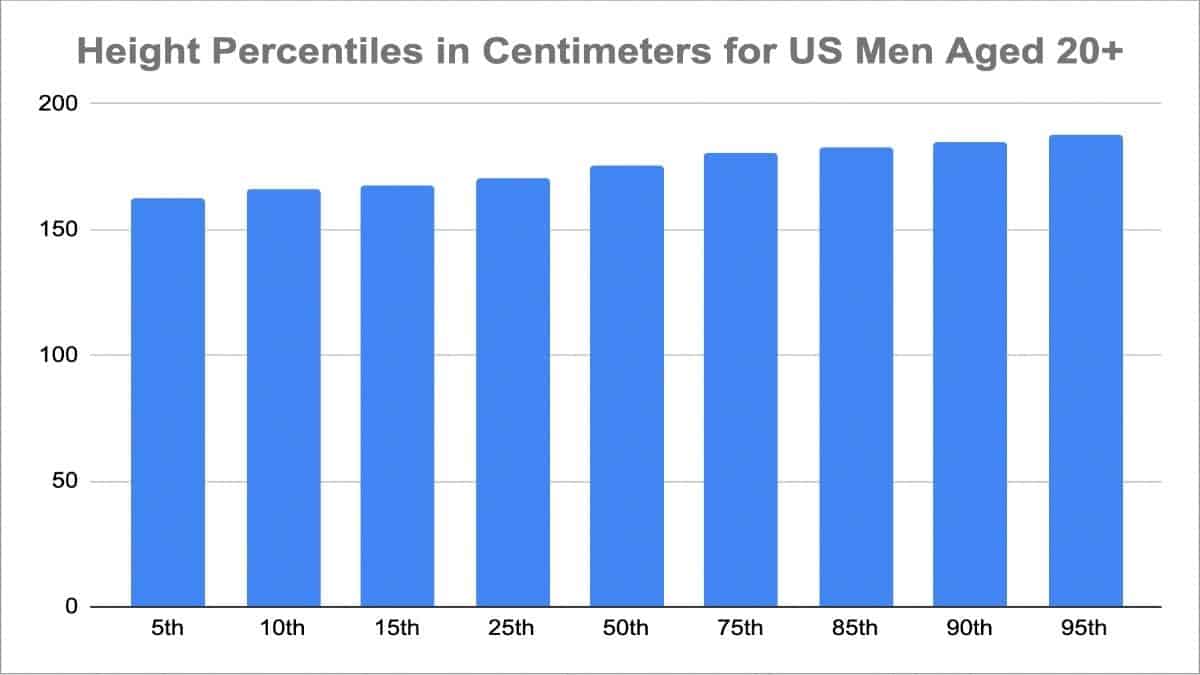Average Height For American Men: Breaking Down The Stats And Stories
When it comes to the average height for American men, there's more than just numbers at play. This topic is a fascinating blend of biology, genetics, lifestyle, and cultural perceptions. Whether you're curious about how tall the average guy in the U.S. stands or how this measurement impacts daily life, you're in the right place. So, buckle up, because we're diving deep into the world of heights!
Height has always been a topic of interest for many people. From movies to dating apps, height often plays a role in how we perceive ourselves and others. For American men, the average height is not just a statistic—it's a reflection of health, genetics, and even social trends. In this article, we'll break down the numbers, explore the science behind height, and answer some common questions.
But why does height matter so much? Well, it’s not just about fitting into a pair of jeans or reaching the top shelf. Height can influence everything from self-confidence to career opportunities. And when it comes to American men, the average height tells a story about the nation's health and lifestyle. So, let's get started and uncover the truth behind those inches!
- Rhaenyra Relation To Daenerys A Deep Dive Into The Targaryen Legacy
- Edwin Garrett Moran The Man Who Shaped Modern Business Leadership
Understanding the Average Height for American Men
The average height for American men has been a topic of study for decades. According to the Centers for Disease Control and Prevention (CDC), the average height for men in the United States is around 5 feet 9 inches (175.4 cm). This number might seem straightforward, but it’s the result of years of research and data collection. And guess what? It’s not set in stone.
Factors like age, ethnicity, and even geographic location can influence height. For example, younger generations tend to be taller than older ones due to improvements in nutrition and healthcare. Similarly, men from certain ethnic groups may have slightly different averages based on genetic predispositions.
How is Average Height Measured?
Measuring the average height involves more than just pulling out a tape measure. Researchers use large-scale surveys and studies to gather data from thousands of individuals. The CDC’s National Health and Nutrition Examination Survey (NHANES) is one of the most reliable sources for this kind of information. Through NHANES, researchers collect data on height, weight, and other health metrics to create a comprehensive picture of the population.
- When Did Aberfan Happen Uncovering The Tragic Day That Shook The World
- Teds Voice The Power Of Storytelling In Modern Communication
- Data is collected from a diverse sample of participants.
- Height measurements are taken using standardized methods to ensure accuracy.
- The data is then analyzed to calculate averages and identify trends.
Why Does Height Matter?
Height is more than just a physical attribute—it’s a social and psychological factor that affects many aspects of life. For American men, being taller or shorter than average can influence everything from dating to job interviews. But why does society place so much emphasis on height?
Historically, height has been associated with strength, leadership, and even intelligence. These perceptions may not always be accurate, but they persist in various cultures, including the U.S. In some cases, taller men may be seen as more authoritative or trustworthy, which can give them an edge in certain situations.
The Psychology of Height
Psychologists have long studied the impact of height on self-esteem and social interactions. Research shows that taller men often report higher levels of confidence and are perceived as more competent by others. However, this doesn’t mean shorter men can’t succeed. It’s all about embracing who you are and using your unique qualities to your advantage.
Interestingly, studies also suggest that height preferences can vary depending on cultural norms and individual preferences. While some people may prioritize height in a partner, others value qualities like kindness, intelligence, or humor above all else.
Genetics vs. Environment: What Determines Height?
So, what exactly determines how tall an American man will be? The answer lies in a combination of genetics and environmental factors. While genetics play a significant role, external influences like nutrition, exercise, and healthcare can also impact height.
Genetically speaking, height is influenced by a complex interplay of genes inherited from both parents. However, environmental factors like diet and lifestyle can either enhance or limit genetic potential. For example, a well-balanced diet rich in calcium, vitamin D, and protein can help children reach their maximum height potential.
The Role of Nutrition
Nutrition is one of the most important factors affecting height during childhood and adolescence. Children who receive adequate nutrition are more likely to grow taller and healthier. On the flip side, malnutrition or poor eating habits can stunt growth and lead to other health issues.
Here are some key nutrients that support healthy growth:
- Calcium: Essential for strong bones and teeth.
- Vitamin D: Helps the body absorb calcium.
- Protein: Builds and repairs tissues.
- Iron: Prevents anemia and supports overall health.
Height Trends Over Time
Over the years, the average height for American men has changed due to advancements in healthcare, nutrition, and living conditions. In the early 20th century, the average height was significantly lower than it is today. But as society progressed, so did the height of its population.
However, it’s worth noting that the U.S. is no longer among the tallest nations in the world. Countries like the Netherlands and Iceland have surpassed the U.S. in terms of average height, thanks to their focus on public health and nutrition. This shift highlights the importance of continued investment in healthcare and education.
Global Comparisons
When compared to other countries, American men are still relatively tall, but they lag behind some European nations. Here’s a quick comparison:
- Netherlands: Average height for men is around 5 feet 11 inches (180 cm).
- Iceland: Average height for men is around 5 feet 10 inches (178 cm).
- United States: Average height for men is around 5 feet 9 inches (175 cm).
These differences can be attributed to variations in genetics, diet, and healthcare systems. While the U.S. has made significant progress, there’s always room for improvement.
Common Misconceptions About Height
There are plenty of myths and misconceptions surrounding height, especially when it comes to American men. Some people believe that height is entirely determined by genetics, while others think that supplements or exercises can magically increase height after adolescence. Let’s debunk a few of these myths:
- Myth 1: Drinking milk will make you taller. While milk is a good source of calcium, it won’t guarantee extra height unless consumed as part of a balanced diet.
- Myth 2: Supplements can increase height after puberty. Unfortunately, once your growth plates close, there’s no way to naturally increase your height.
- Myth 3: Height is the most important factor in success. While height can influence certain perceptions, it’s far from the only factor that matters.
Separating Fact from Fiction
It’s important to approach height-related claims with a critical eye. While some products or exercises may claim to increase height, the reality is that genetics and early-life factors play the biggest role. That being said, maintaining good posture and practicing healthy habits can help you make the most of your height.
Height and Health: The Connection
Height is not just a cosmetic trait—it’s also linked to various health outcomes. Studies have shown that taller individuals may have a lower risk of certain diseases, such as heart disease and diabetes. However, they may also face a higher risk of conditions like cancer. Why is this the case?
Scientists believe that height is influenced by the same factors that affect overall health, such as genetics and nutrition. For example, a well-nourished child is more likely to grow taller and develop a strong immune system. On the other hand, poor nutrition during childhood can lead to stunted growth and increased susceptibility to illness.
Tips for Maintaining Good Health
Regardless of your height, there are steps you can take to improve your overall health:
- Eat a balanced diet rich in fruits, vegetables, and whole grains.
- Stay physically active with regular exercise.
- Get enough sleep to support growth and recovery.
- Avoid smoking and excessive alcohol consumption.
Height and Society: Perception vs. Reality
Society often places a lot of emphasis on height, especially when it comes to men. But how much of this perception is based on reality? While taller men may enjoy certain advantages, shorter men can thrive in their own ways. It’s all about confidence and embracing your unique qualities.
For example, many successful leaders, athletes, and celebrities defy traditional height expectations. Actor Tom Cruise, who stands at around 5 feet 7 inches (170 cm), has become one of Hollywood’s biggest stars. Similarly, business magnate Warren Buffett, who is also shorter than average, is widely regarded as one of the greatest investors of all time.
Building Confidence Beyond Height
If you’re shorter than average, don’t let societal expectations hold you back. Focus on developing skills, building relationships, and pursuing your passions. Confidence and competence are far more important than physical attributes in the long run.
Conclusion: Embracing Your Height
In conclusion, the average height for American men is around 5 feet 9 inches (175 cm), but this number is just a starting point. Height is influenced by a combination of genetics, nutrition, and lifestyle factors, and it plays a role in both personal and professional life. However, it’s important to remember that height is not the only measure of success or worth.
Whether you’re tall, short, or somewhere in between, the key is to embrace who you are and focus on the things that truly matter. By maintaining good health, building confidence, and pursuing your goals, you can achieve greatness regardless of your height.
So, what are you waiting for? Share this article with your friends, leave a comment below, and let’s continue the conversation about height and all its complexities!
Table of Contents
- Understanding the Average Height for American Men
- Why Does Height Matter?
- Genetics vs. Environment: What Determines Height?
- Height Trends Over Time
- Common Misconceptions About Height
- Height and Health: The Connection
- Height and Society: Perception vs. Reality
- Top Photographers In Atlanta Georgia Your Ultimate Guide To Capturing Memories
- Who Voices Ted In Ted The Untold Story Behind The Iconic Role

Average Height of American Men WorldAtlas

Average Height of American Men WorldAtlas

Average Height For Men 2024 Hedy Ralina